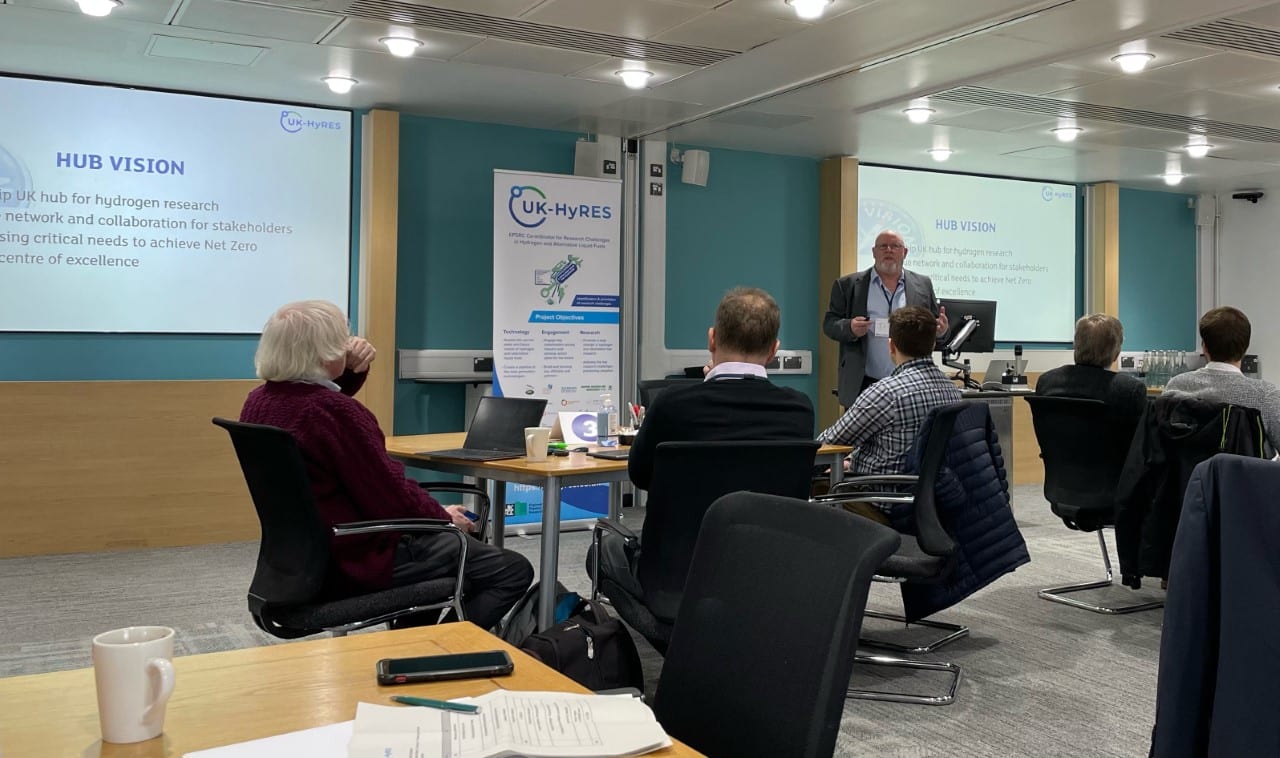REGIONAL ROADSHOWS
WARWICK | 02/02/23
SHEFFIELD | 06/03/23
WESTMINSTER | 17/03/23
During the second phase of the UK-HyRES coordination project, three Regional Roadshows were held to convene leading experts and industrial partners. The objective of these events was to deliberate the challenges and opportunities of the hydrogen energy industry and propose solutions towards achieving the UK’s aim of achieving net zero emissions by 2050.
The one-day workshops brought together representatives from universities and various industries across each region, offering a platform for participants to share ideas and collaborate on finding solutions. The events were facilitated by expert facilitators, The Collective, who used the theory of change to drive tangible outcomes. Over 120 participants joined us across the three events, which were interactive and participatory.

PI Professor Tim Mays presents the proposed Hub vision at the Warwick Regional Roadshow 2023.
The discussions at the Roadshow events encompassed a broad range of topics, including the proposed research hub in hydrogen and alternative liquid fuels. One of the key themes was the storage of hydrogen, where participants explored different storage solutions such as compressed hydrogen gas, liquid hydrogen, and solid-state storage. The discussions highlighted the need to develop safe, cost-effective, and environmentally friendly methods for storing hydrogen. Participants also recognised the challenges associated with the high pressure requirements for compressed hydrogen gas and the low temperatures needed for liquid hydrogen, emphasising the need for innovative storage technologies and a deeper understanding of material behaviour.
The role of government policies in promoting the hydrogen energy industry was also deliberated, along with various methods of hydrogen production such as green synthesis, electrolysis, and bioprocesses. The participants evaluated the advantages and disadvantages of each method, emphasising the importance of developing low-cost, scalable, and green hydrogen production methods to make hydrogen energy accessible to a wider range of applications.
The end use of hydrogen was another key discussion topic, where the participants explored its various applications such as aerospace, heavy goods vehicles, agriculture, food production, and power generation. The discussions highlighted the challenges associated with the implementation of these technologies, emphasising the need to develop safe and reliable hydrogen fuel cell technologies and a supportive infrastructure, including hydrogen refuelling stations, to enable widespread deployment of hydrogen energy.

Participant discussions in Church House Westminster – Regional Roadshows 2023.
The workshops also covered cross-cutting themes such as safety, economics, environmental impact, and social acceptability. Participants emphasised the importance of conducting life cycle analyses to understand the environmental impact of hydrogen energy and the role of government policies in promoting sustainable and socially acceptable hydrogen energy solutions. Safety aspects were discussed in Sheffield, where Co-I Prof. Joan Cordiner led the discussion around hydrogen pipelines and the necessary safety considerations. In London, risk perception and arguments around public acceptance were highlighted, with social scientists arguing for the importance of the field to precede the radical changes needed in response to Net Zero.
In Sheffield, fruitful discussions around decarbonising the steel industry took place, where the participants deliberated the challenges of switching from monitoring hydrocarbon-fuelled forges to pure hydrogen-oxygen flames. Similarly, in London, the participants discussed how Glycerol, a useful substance in hydrogen production, can be sourced as waste from the paper industry.
To summarise, the UK-HyRES Regional Roadshow series was a valuable opportunity for experts to engage in meaningful discussions about the challenges and opportunities facing the hydrogen energy industry. The insights, proposals, and networks developed during the workshops will play a crucial role in shaping the future of clean energy and helping the UK achieve its goal of net zero emissions by 2050. The visualisations from Scriberia will follow shortly. We appreciate all the valuable discussions that took place.

